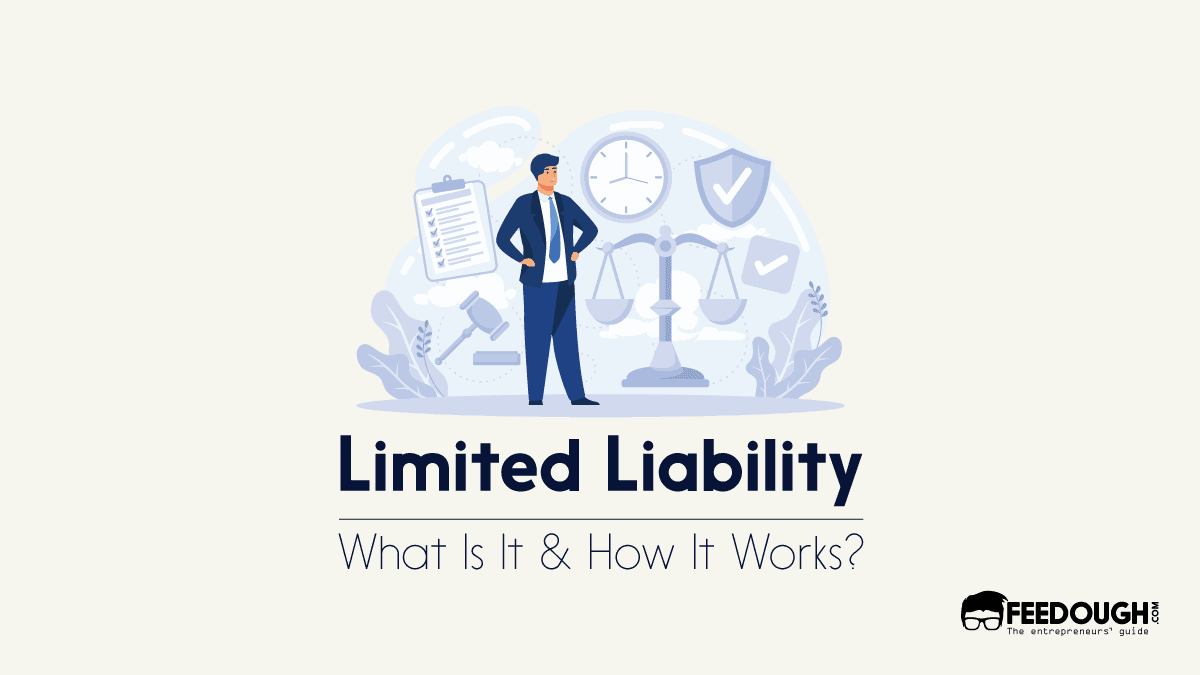In legal terms, a company is also an artificial or fictitious person, separate from its founders, that has quantifiable money in its pocket. That is, it cannot pay more than the amount of money it has. Limited liability is a concept that safeguards this artificial person from being legally liable for more than the amount of money it has. But there’s more to this concept of limited liability and how it works.
Here’s a guide explaining the definition of limited liability, its importance, and how it works in practice.
What Is Limited Liability?
Limited liability is a legal concept stating that the liabilities of a business’s shareholders (owners and investors) are limited to the capital invested by them in the corporation, company, or partnership. It doesn’t extend to their personal assets.
In simple terms, limited liability separates the business organisation from its owners, investors, and shareholders in terms of legal liability. This, in turn, shields them from being personally liable for the debts or obligations of that business. So, if a business’s debts exceed its assets in the future, that company or corporation can go bankrupt without its owners risking their personal assets.
Limited Liability Applications
The concept of limited liability is usually used in the context of these three business organisations:
- Limited Liability Company: A Limited Liability Company (LLC) is a business entity owned and managed by a group of individuals who invest money in the company. An LLC provides limited liability to its owners, which means owners’ liability is only limited to the investment they made in the company.
- Corporation: A corporation is a business entity owned by one or more investors and managed by appointed officers. Just like an LLC, a corporation is a separate entity from its owners and provides limited liability to them.
- Limited Liability Partnership: A limited liability partnership is a business entity formed by two or more individuals who share the profits, losses, liabilities, and assets of the business. But unlike normal partnerships where the partners are personally liable for the debts of their business, a limited liability partnership limits the personal liabilities of each partner to only their respective capital investments.
Importance Of Limited Liability
The concept of limited liability is an important part of any corporate structure as it ensures that the shareholders only risk the amount they’ve invested in the company and not any other assets if something goes wrong.
It also encourages entrepreneurs to start businesses and attract investors as they know their investments will be safe in case of a financial loss. Limited liability also helps create a secure business environment free from the fear of personal risk and liabilities.
It’s necessary to note that limited liability does not mean that the owners are absolved from all legal responsibility for their company. It just means that they will not be held liable to pay more than the amount of capital and investments they have in the company or corporation.
How Limited Liability Works
When a business organisation registers itself as a corporation, LLC, or LLP, it is treated as a separate legal entity from its founders and shareholders. That means the business will be liable for its debts and obligations and not for its owners.
In addition to this separation of liabilities, limited liability also ensures that the company’s assets are separated from those owned by its owners and shareholders, ensuring that the owners do not risk their personal assets in case of a financial loss.
But sometimes, this business concept can be tricky to understand how it works in practice.
To start with, it’s important to realise that limited liability protects the owners from having to pay out of pocket for debts and liabilities incurred by the company, but it doesn’t protect them from other kinds of legal action.
For example, if a company runs into legal trouble and is sued during its lifetime, its shareholders may still be held accountable for their actions; they won’t be protected under the concept of limited liability if they are found guilty and required to pay damages.
However, limited liability can also provide some protection in this scenario. If the shareholders are found to be negligent or have acted without due care, they will not be held personally liable for any legal action against the company.
Advantages And Disadvantages Of Limited Liability
Limited liability comes with a set of advantages and disadvantages. Here’s a quick overview of both:
Advantages Of Limited Liability
The biggest advantage of limited liability is that it protects the personal assets of owners and shareholders from being used to pay for debts or liabilities incurred by the company. Besides this, limited liability also has the following advantages:
- It attracts more investors as they are only liable to the extent of their investment.
- It helps reduce legal risks as owners and shareholders are not personally liable for any legal action against the company.
- It has tax benefits as profits are not subject to personal tax but are taxed at the company’s rate.
- The company can exist even after any of its owners leave or die.
Disadvantages Of Limited Liability
The concept of limited liability also has its own set of drawbacks. These include:
- It increases the company’s complexity, requiring more paperwork and legal filing.
- It can also result in higher taxes for owners and shareholders, as non-business-related expenses and losses cannot be offset against business income.
Limited Liability Example
Suppose two people, A and B, start a business and register it as an LLC. Both A and B will be the owners of this business, and they each have to invest $10,000 in the company.
Now, if the company takes a loan of $40,000 from a bank but defaults on it, the bank cannot ask the owners to pay back that loan. They will only be liable to pay $10,000 each and no more than that due to the concept of limited liability.
That is, the bank will get only $20,000 back and have to put the rest $20,000 as bad debt.
Limited Liability Vs Unlimited Liability
The concept of limited liability can be contrasted with unlimited liability as it is seen with sole proprietorship and general partnerships.
Limited Liability | Unlimited Liability | |
Definition | The owners’ liability is restricted to the amount they have invested in the business. Their personal assets are protected. | The owners are personally and fully responsible for all debts and liabilities of the business. There is no protection for personal assets. |
Risk | Lower risk as the personal assets of the owners are not at stake. | Higher risk as the personal assets of the owners can be used to pay off the business debts. |
Businesses | Typically associated with corporations, limited liability companies (LLCs), and limited partnerships. | Usually associated with sole proprietorships and general partnerships. |
Debt | The company’s debt is not considered the debt of the owners. | The debt of the business is considered to be the debt of the owners. |
Legal Status | The business is a separate legal entity from its owners. | There is no legal distinction between the business and its owners. |
Bankruptcy | If the business goes bankrupt, the owners lose only the money they have invested into the business. | If the business goes bankrupt, the owners could lose personal assets to cover the business debts. |
Management and Control | Often, ownership and management can be separate. This can lead to more professional management. | Generally, the owners have direct control over all aspects of the business. |
Formation | More legal formalities and higher costs involved in the formation. | Fewer legal formalities and lower costs involved in formation. |
A startup consultant, digital marketer, traveller, and philomath. Aashish has worked with over 20 startups and successfully helped them ideate, raise money, and succeed. When not working, he can be found hiking, camping, and stargazing.









